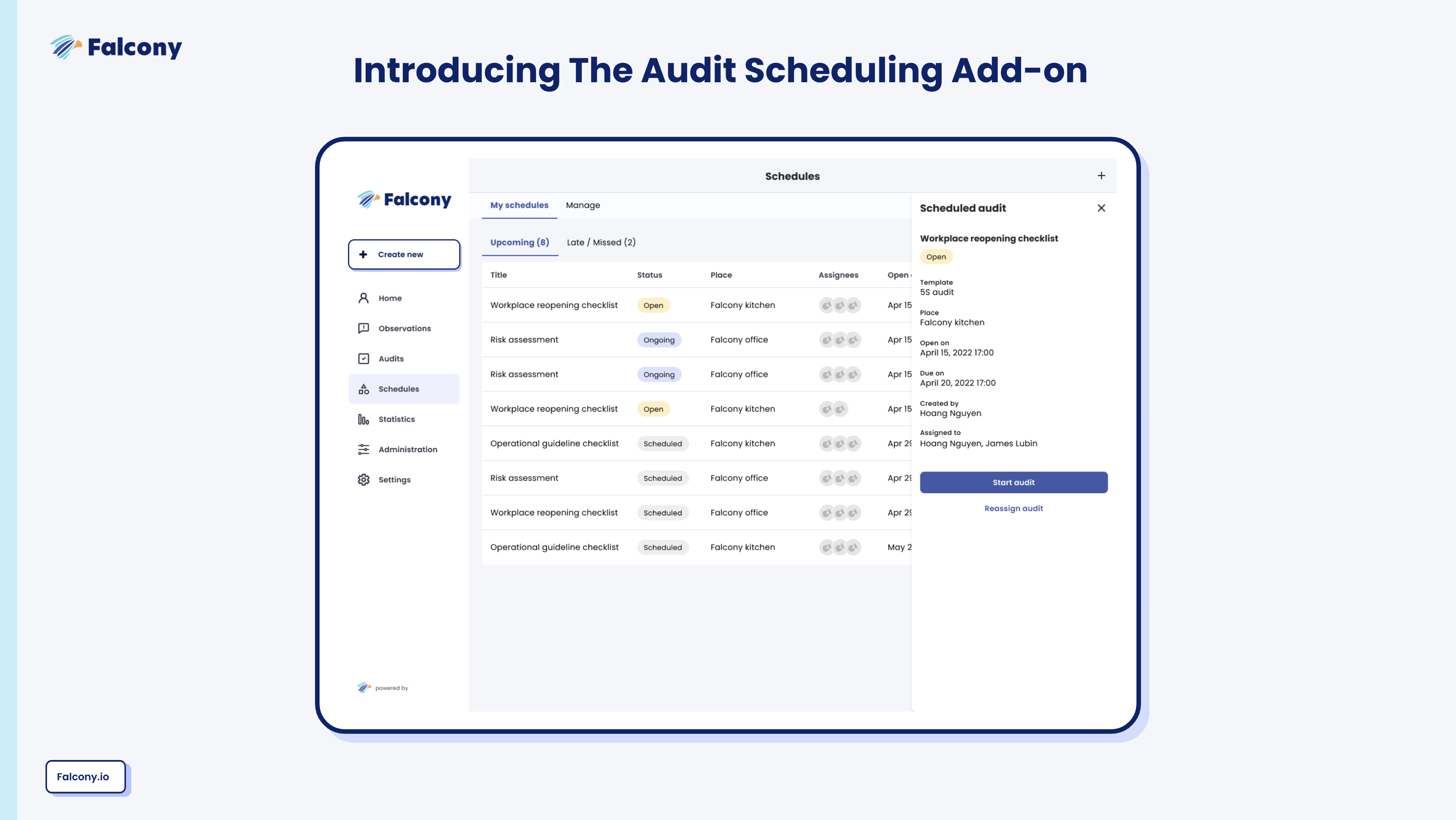Falcony Launches The Audit Scheduling Add-On
For our auditing customers, one of the most requested improvements we’ve ever received has been the audit planning and scheduling. Today we are proudly launching the Audit Scheduling functionality as an add-on for the Falcony Audit product.
This is the first blog post from our recent launch event held on the 1st of March 2023. More blog posts about other updates will follow soon.
The problem of low audit completion rates
During World War 2, the US Military tried to determine how much and where they needed to armour their aircraft to ensure they came back to homebase from missions. By armoring the planes they faced a problem. Too less armor and the planes were shot down on missions. But too much armour would make the planes heavier, and heavier planes would be less manoeuvrable and use more fuel. So armoring the planes too much is a problem; armoring the planes too little is a problem. Somewhere in between there’s an optimum.
Looking for a mathematical optimum, they decided to give the task to a team led by a mathematician called Abraham Wald. This was not a task to take lightly as human lives were on the line and the enemy was no other than the Nazi Germany.
Luckily the military had existing data for the math team to use. When American planes came back from engagements over Europe, they were covered in bullet holes. But the damage wasn’t uniformly spread across the aircraft. There were more bullet holes in the wings and fuselage then on other areas of the planes.

So here’s the question: you have this data. Planes looking like above. Where do you put more armour? And even more important, why?
What the military officers had thought was to concentrate more armour in the places where the planes were getting hit the most. But exactly how much more armour belonged on those parts of the plane? That was the question they asked from Abraham Wald. But it sure wasn’t the answer they got.
“The armour”, said Wald, “doesn’t go where the bullet holes are. It goes where the bullet holes aren’t: on the engines.”
The military thought Wald was crazy. That’s not where the planes were getting shot. But Wald realised what the others didn’t. The planes were getting shot there too, but those planes weren’t making it back home.
The missing bullet holes were on the missing planes. The reason planes were coming back with fewer hits to the engine is that planes that got hit in the engine weren’t coming back.
The missing bullet holes were the missing data, which brings us to audit completion rates.

On average a full quarter of all audits, inspections and checks never get completed. With missing data, the conclusions made of the actually conducted audits are always at risk of answering the wrong questions. The worse the audit completion rates, the bigger the problem.
There are three main reasons why this happens:
- The employees responsible for conducting the audits are simply too busy
- They don’t know how to do them or the tools they should use are too difficult
- They simply forget to do them
The first is an organisational problem. You shouldn’t introduce routines, procedures and processes that don’t make sense. But when they make sense, with the right incentives, either carrot or stick, they should become part of normal work. The second solution is what we at Falcony have been pushing for, so usability, mobile access and having just one platform for several use cases. But the third one is trickier. Doesn’t it work if we just remind the auditors more?
The answer is firm No. Why? Because it’s really costly to use the managers’ time to keep reminding of upcoming work, at some point it starts to feel like micromanagement and like we know, nobody really likes to be reminded all the time.
What the audit scheduling add-on really does is that it slashes down the “Don’t you forget to do it” barrier by automating what managers are used to doing manually.
Audit scheduling functionalities
In one sentence, audit scheduling will help you plan and schedule audits into the future but that’s just a part of it. Instead of considering only one-off schedules, like let’s say “audit all the properties’ conditions this year”, you can also create recurring schedules, like weekly, monthly or quarterly checks and inspections that are automatically created in each recurring cycle.
The more audits you, your team or your organisation need to carry out, the more it makes sense to have visibility for all of them, not just for your own selfish reasons of staying on top of things, but also for resourcing and capacity reasons.

Then when the schedule is set live, you have full visibility where each audit is going, whether upcoming or ongoing, started or not started, completed or missed.
Speaking of missed audits, every single scheduled audit sends automated reminders for auditors. This is big as you as a manager won’t need to do it manually anymore. Then again a machine-generated reminder is not as frustrating to hear as a boss saying it. We aim to help you and your team never to miss an audit again.
But we’d even go so far as to say that time saved from reminders can be used to implement even better processes: new audits, self-assessments, risk assessments, inspections, or maybe add new questions to existing audits, remove sections or change scoring. All in all, spend your time on improving instead of micromanaging.
Since we like frameworks so much, we want to show how adding and improving processes and audits can help you. With more and better audits, your team is more involved generating more observations and thus data. Better and more complete data leads to better reports and dashboards that, of course, management teams tend to like. And when they like it, they ask for more of the same.
Conclusion
With the audit scheduling add-on, you can make sure all the audits get done. That leads to greater involvement and better data, arming you to know what's really going on, to make continuous improvements and to earn the respect you deserve.
If you are interested in learning more about the Audit Scheduling add-on, check our dedicated product page here:
We are building the world's first operational involvement platform. Our mission is to make the process of finding, sharing, fixing and learning from issues and observations as easy as thinking about them and as rewarding as being remembered for them.
By doing this, we are making work more meaningful for all parties involved.
More information at falcony.io.

Related posts
5 Ways to be as Efficient in Auditing, While Cutting Costs and Boosting Reliability
If you are in an industry that sets a high standard for the products you offer, auditing the...
8 Features a Facility Audit Software Needs to Have
A full-stack facility audit software has basically four parts in it. Firstly, with the software the...
Falcony's new Idea Generation solution helps you get 50x more ideas
Ideas. Initiatives. Suggestions. They are all types of observations that most companies generate...




